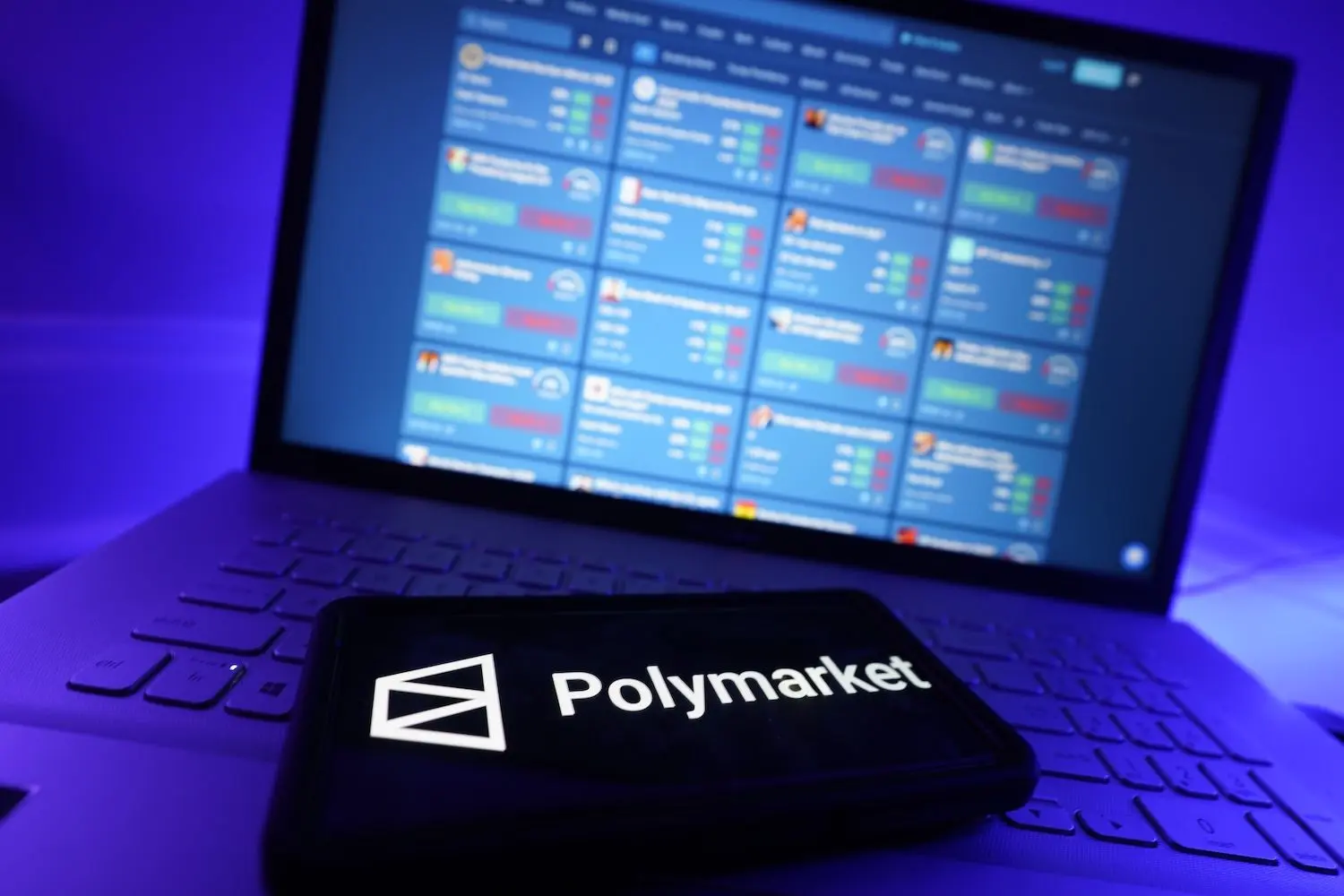Polymarket's chief marketing officer confirmed the company will launch a native token and conduct an airdrop to users, the first official acknowledgment of plans that have circulated for months among traders on the prediction-market platform. The announcement from Matthew Modabber follows a $2 billion investment from Intercontinental Exchange, the parent company of the New York Stock Exchange, and comes as Polymarket logged $2.9 billion in trading volume last month.
What to Know:
- Polymarket CMO Matthew Modabber confirmed plans for a POLY token and airdrop during a podcast appearance, ending months of speculation about the platform's tokenization strategy.
- The prediction-market platform received a $2 billion investment from Intercontinental Exchange and is relaunching its U.S. app after a 2022 regulatory shutdown.
- Community data shows 1.35 million active traders on Polymarket, with analysts comparing a potential airdrop to past distributions that reached $6.4 billion and $12.6 billion in value.
Token Plans Take Shape Amid U.S. Expansion
Modabber made the disclosure during an appearance on the Degenz Live podcast this week. "There will be a token, um, there will be an airdrop," he said, adding that the company prioritizes building products with staying power over quick launches.
He emphasized Polymarket's methodical approach to the token. "We really pride ourselves on being the most thorough company," Modabber said. "We could have launched a token anytime, but we want it to have true utility and longevity—to be around forever. That's what we expect from ourselves, and that's what everyone in the space expects from us."
The timing reflects the company's current priorities.
Polymarket recently secured regulatory clearance to relaunch its U.S. app after authorities halted operations in 2022.
Modabber questioned the logic of rushing a token while the domestic rollout demands attention. "Why rush a token if we need to prioritize the US app?" he said.
Polymarket founder Shayne Coplan had hinted at tokenization plans earlier, but Modabber's comments represent the company's first direct confirmation. The disclosure has intensified discussions among traders about potential airdrop criteria, with many expecting rewards to track trading history and wallet activity.
Trading Surge and Distribution Expectations
Prediction markets saw sharp growth in September. Polymarket recorded $2.9 billion in volume while competitor Kalshi logged $1.4 billion, according to platform data. The figures represent a notable increase from earlier periods and reflect broader interest in event-driven trading instruments.
Community analysis shows Polymarket hosts 1.35 million active traders across its platform. Wallet distribution remains concentrated, with just 0.5 percent of accounts earning over $1,000 and 1.7 percent trading more than $50,000. The data suggests most users maintain modest positions, though a small cohort drives significant volume.
One researcher noted the potential scale of a POLY distribution.
"Polymarket could easily end up being the biggest airdrop ever," the analyst wrote on X, comparing the scenario to past giveaways from Pi Network and Uniswap. Pi Network distributed tokens valued at $12.6 billion at launch, while Uniswap's 2020 airdrop reached $6.4 billion. Both events drew millions of participants and set benchmarks for token distributions.
Intercontinental Exchange's investment signals institutional appetite for prediction markets. The $2 billion commitment from the New York Stock Exchange's parent company suggests Wall Street views these platforms as risk-pricing tools rather than gambling venues, shifting their perception from fringe applications to financial infrastructure.
Rachel Lin, chief executive of SynFutures, outlined the sector's appeal in an interview with BeInCrypto. "Prediction markets' real value lies in quantifying what traditional finance can't — policy decisions, tech breakthroughs, and geopolitical risks," she said. The assessment points to use cases beyond election forecasting, including corporate events and macroeconomic trends.
Industry analysts from Delphi Digital identified emerging opportunities in prediction-market infrastructure. They noted that professional trading terminals combining multiple venues, real-time data and analytics could create a new segment similar to recent speculative trading booms. The firm suggested demand exists among sophisticated traders for tools that aggregate prediction-market liquidity.
Understanding Prediction Markets and Airdrops
Prediction markets allow users to trade contracts tied to real-world event outcomes. Participants buy shares representing different results, with prices reflecting collective probability assessments. When events resolve, winning positions pay out while losing positions expire worthless. The mechanism channels crowd wisdom into price signals that often outperform expert forecasts.
Airdrops distribute tokens to users based on past activity or holdings.
Projects typically use them to reward early participants, bootstrap networks and distribute governance rights. Recipients receive tokens without payment, though tax obligations may apply depending on jurisdiction. Large airdrops can create significant wealth for active users while expanding a token's holder base.
Regulatory uncertainty remains a constraint. U.S. agencies continue debating whether prediction markets constitute derivatives contracts or gambling operations, with different frameworks applying to each category. The classification affects licensing requirements, trading restrictions and enforcement priorities. Until regulators establish clear guidelines, platforms face operational risks when expanding domestic offerings.
Industry Sees Validation in Institutional Capital
Modabber's confirmation has focused attention on Polymarket's trajectory as both institutional capital and retail participation grow. The POLY token represents an attempt to formalize the platform's economics while rewarding its user base. With regulatory approvals progressing and trading volumes climbing, the company appears positioned to test whether prediction markets can establish themselves in mainstream finance.



